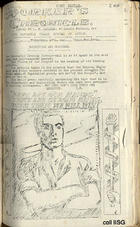 The archive collections include information on many anarchist and socialist organizations and individuals and thus reflect the traditional IISH acquisitions policy. There are two archives from renowned feminists Sylvia Pankhurst and Dora Russell. The Dora Russell (1894-1986) archive contains records on her achievements as a freethinker, proponent of sexual reform, and socialist who participated in the peace movement until her death. She actively participated in the Labour Party and the Independent Labour Party. In 1927, Dora and her husband Bertrand founded the experimental Beacon Hill School, which Dora kept going at various locations until 1943. In addition to her personal papers, the Dora Russell archive contains records from her school and her students.
The archive collections include information on many anarchist and socialist organizations and individuals and thus reflect the traditional IISH acquisitions policy. There are two archives from renowned feminists Sylvia Pankhurst and Dora Russell. The Dora Russell (1894-1986) archive contains records on her achievements as a freethinker, proponent of sexual reform, and socialist who participated in the peace movement until her death. She actively participated in the Labour Party and the Independent Labour Party. In 1927, Dora and her husband Bertrand founded the experimental Beacon Hill School, which Dora kept going at various locations until 1943. In addition to her personal papers, the Dora Russell archive contains records from her school and her students.
Sylvia Pankhurst (1882-1960), founder of the 'East London Federation of Suffragettes' in 1913, became a prominent anti-fascist in the 1930s. She focused on practical applications of socialism, including the establishment of infant welfare services and restaurants for mothers. Her papers reflect all these activities.
The archive of Freedom is the most extensive in the anarchist section. It takes up 17 meters of shelf space and covers the period from 1886 to 1980. Freedom started as an anarchist periodical by a group of friends around Peter Kropotkin. The group eventually set up the Freedom Press that was to become the main publisher of anarchist literature in England. The IISH also keeps the records of Freedom editors Alfred Marsh and Vernon Richards just as well. A rival Freedom was published from 1930-1936 by opponents such as Oscar Swede, whose papers are kept by the Institute. The publication of Freedom still continues today. One of Freedom's most prolific contributors was the Austrian anarchist Max Nettlau (1865-1944). Nettlau lived in London for many years and enthusiastically collected archives and printed materials from the anarchist movement. One of the collections he rescued was the records of the Socialist League. All materials collected by Max Nettlau ended up at the IISH in 1938.
The Socialist League (1885-1895) had been founded as a breakaway from the Social Democratic Federation. The archives of the Social Democratic Federation and many other political associates may be consulted on microfilm at the IISH. The microfilm section includes the archives, or part of the archives, of the Independent Labour Party, the Labour Party, the Fabian Society, the British Socialist Party, and the Trade Union Congress. The papers of Frederick Yates (1908-1991) cover a lengthy period of British communism. The General Strike, which brought British society to a standstill in 1926, generated a wealth of strike bulletins and reports of local committees. These were exhaustively collected by Raymond Postgate, one of the founders of the Communist Party in Great Britain. This beautiful collection of strike bulletins came to the IISH through the intermediary of Postgate's brother-in-law, professor G.D.H. Cole, who was involved in the establishment of a branch of the Institute in Oxford in 1940. George Cole, founder of the National Guilds League and for many years active in the Fabian Society, donated part of his own papers to the IISH.
The British peace movement, including materials from conscientious objectors, is very well represented in the IISH. The enormous archive of the War Resisters' International WRI, despite its international aspirations, has a decidedly British character. The Dora Russell papers, mentioned above, contain a complete documentation of the 'Women's Caravan of Peace'. Harold Bing (1897-1975), a conscientious objector imprisoned during the First World War, was a lifelong activist for WRI, the No More War Movement, and the Peace Pledge Union; he also wrote the history of the WRI.
The National Committee of Hundred was founded in October 1960 as a movement of non-violent resistance to nuclear war. It organized marches against nuclear testing, and from the mid 1960s, actions against the war in Vietnam. The archive of the C.W. Daniel Publishing Company (1902), named for its owner Charles William Daniel, is also included in this section. Daniel was strongly influenced by Tolstoy and went to visit the great Russian writer in 1909. The publishing house was a forum for Tolstoians, anarchists, pacifists, and health food advocates.
